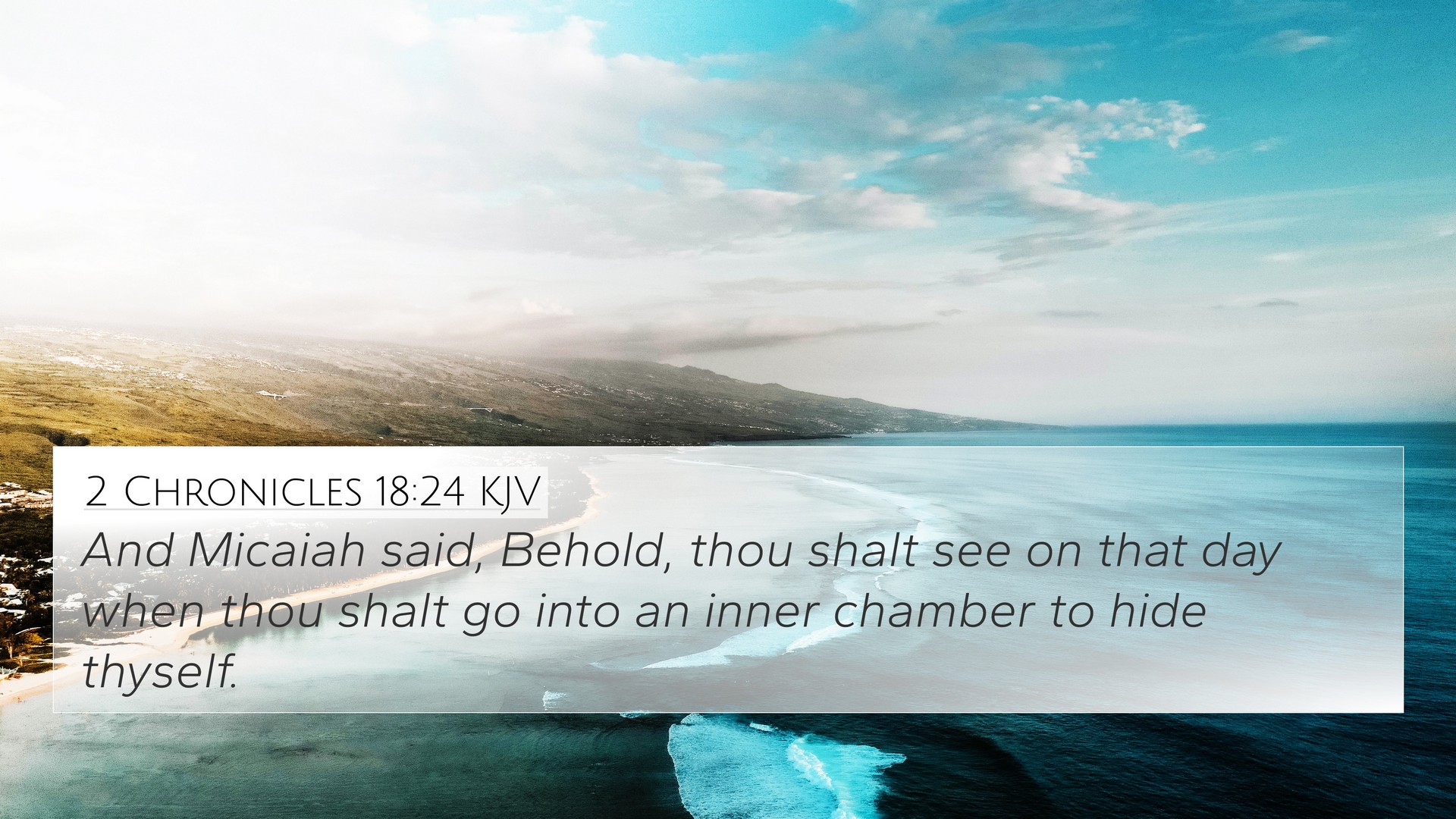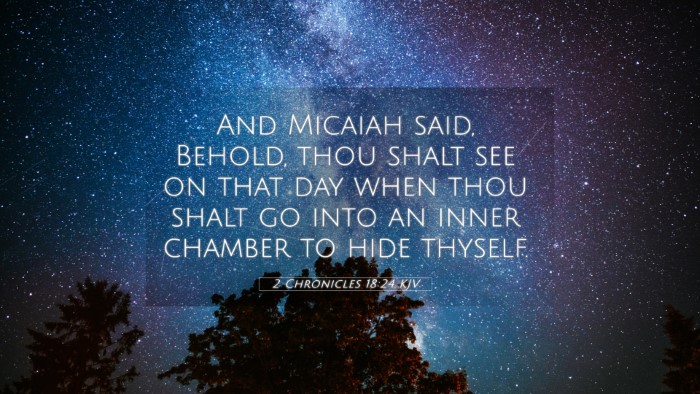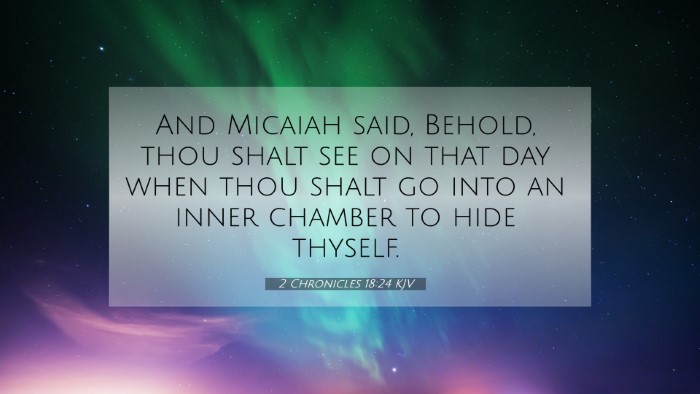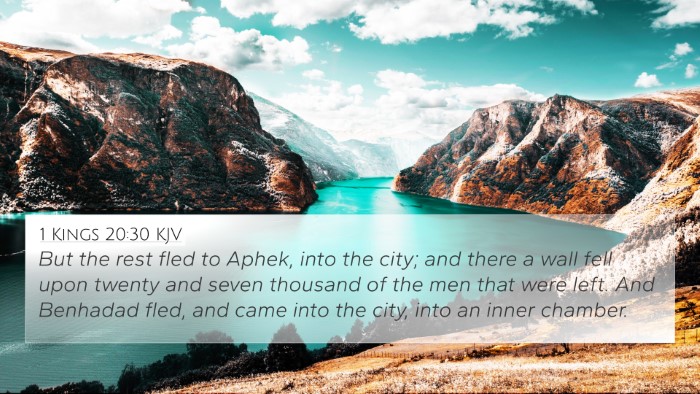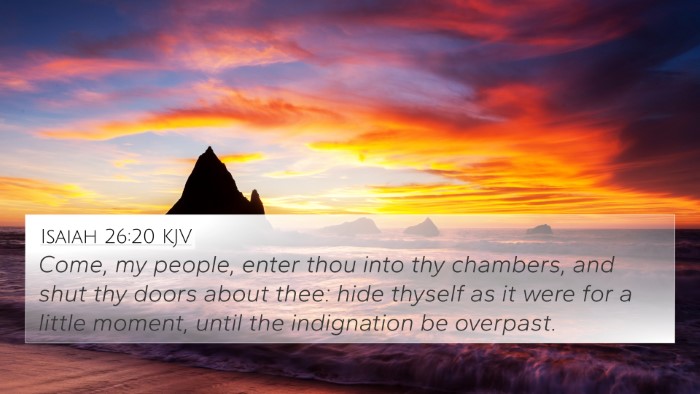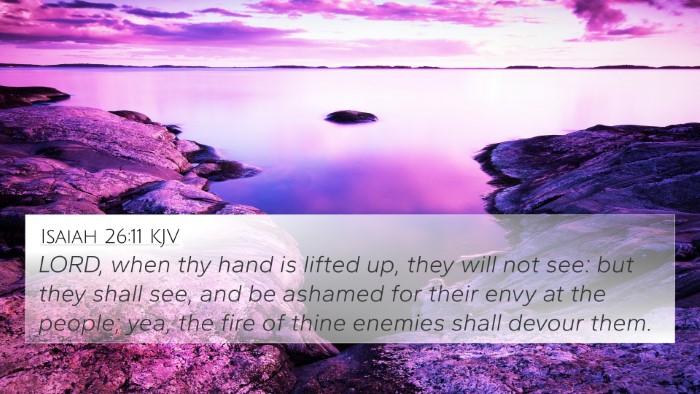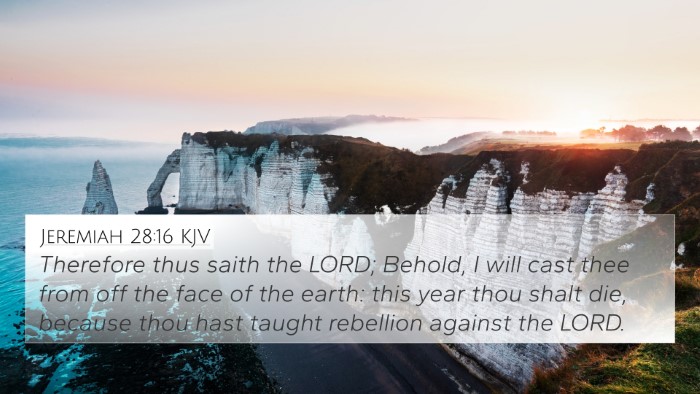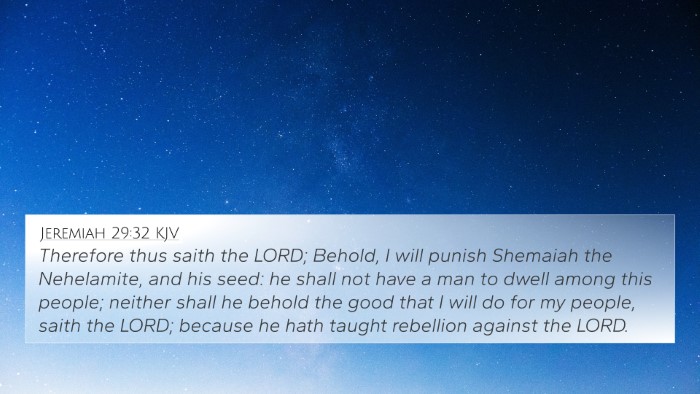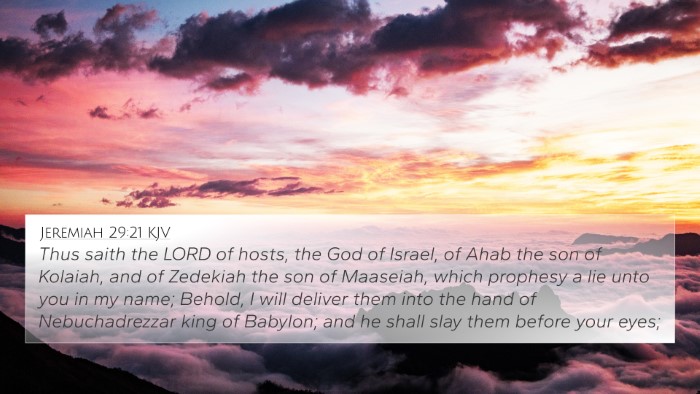Understanding 2 Chronicles 18:24
2 Chronicles 18:24 states: "And Micaiah said, Behold, thou shalt see on that day when thou shalt go into an inner chamber to hide thyself." This verse has significant implications in the context of prophetic truth and divine judgment. Below, we explore its meaning through various public domain commentaries, connecting themes, and related scripture.
Summary of 2 Chronicles 18:24
This verse occurs in a passage depicting King Ahab’s interactions with prophets regarding his impending battle. Micaiah the prophet warns Ahab that he will seek to hide from the truth and the consequences of his actions. Micaiah’s declaration underscores the futility of trying to escape God’s judgment.
Commentary Insights
- Matthew Henry: Henry emphasizes the integrity of Micaiah as a true prophet, contrasting him with the false prophets of Ahab. He highlights the critical nature of Micaiah's warning, suggesting it symbolizes the inevitable consequences of Ahab's decisions. Micaiah speaks truth to power, perhaps foreshadowing Ahab's attempts to escape from God’s ordained judgment.
- Albert Barnes: Barnes elaborates on the significance of Micaiah's statement, pointing out the concept of hiding as symbolic of Ahab’s dread of the truth. He suggests that true believers cannot hide from God, and this verse reflects how the judgment of God confronts the unrighteous, compelling them to confront their fate, regardless of their attempts to evade accountability.
- Adam Clarke: Clarke discusses the prophetic spirit and its implications during this period in Israel's history. He notes that when judgments are pronounced, those who defy God often resort to hiding from the consequences, similar to Adam and Eve in the Garden. Clarke sees Micaiah's words as a challenge to Ahab’s faith and decisions, reinforcing the belief that one cannot escape divine oversight.
Thematic Connections
2 Chronicles 18:24 highlights several key themes relevant to a deeper understanding of Biblical prophecy and divine accountability:
- The Role of Prophets: This verse exemplifies the critical role prophets play in delivering God’s messages, particularly against the backdrop of kings who may choose convenience over truth.
- Accountability Before God: The inevitable consequences of our actions are emphasized, urging believers to confront their choices rather than hide from them.
- The Futility of Hiding: This speaks to the human tendency to escape judgment, an idea echoed in various parts of scripture reflecting the omnipresence of God.
Related Bible Cross-References
This verse connects to a number of other scripture passages that emphasize prophetic messages, accountability, and God’s omnipotence:
- 1 Kings 22:17: Micaiah's earlier declaration of Ahab’s demise reinforces the prophetic warning system.
- Jeremiah 23:29: This verse emphasizes the power of God’s word as a fire, elucidating the theme of unyielding divine truth.
- Amos 9:2: Amos discusses evasion from God’s reach, perfectly paralleling Ahab’s hopeless attempts to hide.
- Psalms 139:7-10: These verses remind believers there’s no place to hide from God, which aligns with the essence of Micaiah’s message.
- Revelation 6:15-17: In this eschatological context, people try to hide from the wrath of the Lamb, paralleling Ahab's fears.
- Proverbs 28:13: This proverb underlines the idea that concealing sin can lead to destruction, reinforcing the fundamental truth that one must confront wrongdoing.
- Luke 12:2-3: Jesus’ teachings about hidden things being revealed resonate with Ahab’s attempt to hide, illustrating the same divine principle of truth coming to light.
Exploring Connections Between Bible Verses
In examining 2 Chronicles 18:24, we delve into the connections that scripture offers, enhancing one’s understanding through comparative analysis:
- Comparative Bible Verse Analysis: By exploring the parallels between the Old Testament accounts of Ahab and the teachings of the New Testament, one can see a consistent narrative of accountability and prophetic warnings.
- Thematic Bible Verse Connections: Micaiah’s warning establishes a theme that reverberates throughout scripture: the inner conflict between obedience to God and the propensity to seek refuge in deceit or denial.
Tools and Resources for Bible Cross-Referencing
For those interested in further study, several tools can assist in cross-referencing and exploring additional connections:
- Bible Concordance: An invaluable tool for locating specific verses and their thematic relationships.
- Bible Cross-Reference Guide: Designed to facilitate exploring similar themes and related scripture passages.
- Cross-Reference Bible Study: Engaging with scripture in this manner can deepen understanding and interconnectivity of Biblical texts.
Conclusion
2 Chronicles 18:24 provides a poignant reminder of the relentless pursuit of truth by God through His prophets. The insights gained from public domain commentaries enrich our understanding of the challenges believers face in confronting divine truth. By cross-referencing this verse with others, we uncover a deeper spiritual narrative that encourages accountability and the recognition that one cannot hide from the divine.
